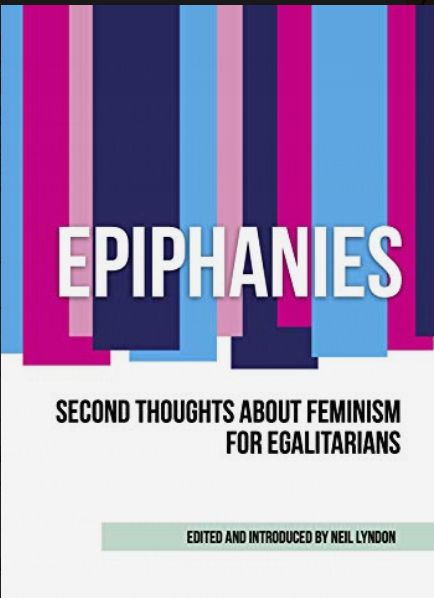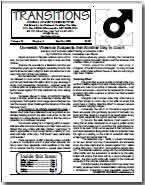Epiphanies: Second Thoughts about Feminism for Egalitarians.Edited by Neil Lyndon. Amazon Kindle, 2020. 198 pages. No price on book but Amazon.com gives price as $3.69. Review by J. Steven Svoboda.
Disclaimer: I have long admired Neil Lyndon and was fortunate enough to meet him in London in 2018, which led to me contributing my own chapter to the book. I am also friends or acquaintances with several of the other contributors to the book.
Neil Lyndon was of course the trail-blazing author of No More Sex War, which appeared in 1992 to the great attention of many of us and to the jeopardy of Neil’s journalistic career, although to his credit he managed to soldier on. Now come the nineteen different authors in this book, ten men and nine women, each telling their unique story of how they came to a sudden realization that the party line about feminism did not add up for them.
Naturally, even inevitably, the contributions vary in how compelling they are. Edward Crabtree, who spent much of his career as an English teacher in Russia, treats us to a modest, reasonable story about his path to question why “other big subjects of the time such as globalism, Marxism, consumerism and historicism were all open for debate, but radical second-wave feminism had arrived in a sacred space, beyond discussion.”
Warren Farrell tops even his usual superlative standards with a truly indelible story outlining the gradual growth of his compassion for men. Unafraid to critically examine his own assumptions, Warren relates that sometime around the mid-1970’s, “I asked myself, ‘If I’m so naturally sensitive, why wasn’t I applying to men the same sensitivity with which I treated women?’… Was I, if only in part, competing to be ‘the biggest jock in the sensitivity group.’?” As Warren thought things through, “my answers incorporated both sexes’ perspectives. As an immediate consequence, almost overnight, my standing ovations disintegrated.”
Warren goes further: “By the late ‘80s, I felt the anger toward men had become institutionalized. The women’s movement had done a wonderful job of freeing women from sex roles, but no one did the same for men. The more women gained advantages, the more its movement went from favouring equality to fearing equality.” Warren came to understand and write, in The Myth of Male Power, about how historically neither sex had power but each sex had roles. Unfortunately this initiated decades of Warren’s work no longer receiving the acknowledgement and approbation it had previously received even with his book about 25 ways that women could earn more.
Eminent academic Janice Fiamengo gives us a “just the facts ma’am,” no nonsense piece about how she became an anti-feminist. As a child, hearing all the messages of female empowerment, “Even at the time, it seemed like overkill: nobody had ever told me I couldn’t [become anything I wanted].” Janice asks: “How many generations of young men will have to be sacrificed to the great gob of equal outcomes before feminists say enough?” Unfortunately with the advent of critical race theory and its kind, we may we worse off in this regard than we have ever been.
She admits to being superficially “attracted to the most extreme of the feminists: Andrea Dworkin with her evangelical denunciation of male evil, Catharine MacKinnon with her abstruse arguments about rape as indistinguishable from consensual sex.” Yet there was an odd disconnection because Janice’s “own life was nothing like what Dworkin or MacKinnon described. I had never met a man who hated women. I had never been discriminated against, never heard a bad thing said about women’s capacities.” As Janice watched her teachers and reflected on the doctrine on which they focused, she had an epiphany of sorts. “I began to wonder what it must be like to sit in a classroom, day after day, year after year, listening to feminist teachers hector them about men’s entitlement and violence.” Men were almost never praised for their hard work, she noted. Nor was anyone meant to empathize with men. Men were encouraged to join campaigns to end violence against women but not violence against men.
I have focused on Professor Fiamengo in this review but she has a few more words I can’t leave out. After the notorious attempt by Warren Farrell to speak in Toronto in 2012, “For me, this was what the feminist movement had become: a sanctioned hate group determined to prevent any discussion amongst men about the realities of their lives…. Most feminists couldn’t care less about gender equality.” Through all their work over the decades, “Feminists have succeeded, perhaps even beyond what they imagined or intended, in creating a culture that has little place for men except… as the recipients of seemingly endless public campaigns to shame them for everything from complimenting women in the wrong way to taking up too much space on the subway.” Accordingly, perhaps almost inevitably, “many men have decided that it is better to have as little to do with women as possible.”
Next comes American psychologist and philosopher Miles Groth, who sheds another light on academia’s continuing and deliberate neglect of males’ needs in college, despite their numbers having dwindled in recent years. Groth gives detailed profiles of no fewer than four “strong, independent women I knew who rejected the idea of the new feminism.” One of his most trenchant points analyzes academia as providing a fertile bed for growth of the distortions of feminism. “Much as mental illness would not have thrived as a social phenomenon without the insane asylum, I believe the new feminism would have shrivelled up without gnawing on the teat of academe.” The invulnerability of the infamous feminist academic darling Judith Butler to any criticism is touched on as well. Groth notes that chemical control of mental illness replaced a previous reliance on insane asylums, and as a result, “Asylum directors were forced to go out of business.”
Author Kristal Garcia contributes her story of healing from a difficult childhood and from her previous negative feelings toward her father. “I held so much pain and rage in me. Most of it I aimed at my father for not being around in my childhood. I blamed him for all of the suffering in my life. And because I blamed my father, I blamed every male on the planet.” Then however, to her credit, Kristal “started listening to what men were telling me about the abuse they suffered from the women they dated. I sat and listened horrified. I was shown scars of knives, forks, fingernails…. This was not the way that I had been told the world worked. Women abuse men too?” Today, Kristal “focus[es] my conversations primarily on men’s rights while I continue to support women’s rights and I support transgender rights. I still focus primarily on men’s rights because our society has a massive blind spot when it comes to listening to the needs of men and relating to their human rights.” Unfortunately, such honesty does not come without consequences. “For speaking up about men’s rights, my treatment continues to this day to be an ugly ordeal. I’ve been told I have ‘internalised misogyny’ for going against the grain and questioning what I have been told to believe about men.”
Elizabeth Hobson, Mother, university student, and leader of the political party Justice for Men & Boys, has written a truly outstanding piece. Elizabeth provides three detailed, heartwarming stories of what she sees in the world, namely, not “a struggle for power between the sexes but… men and women loving and supporting each other.” Elizabeth writes of her growing understanding about how men compete with other men for the attention of women who choose the men exhibiting the qualities they most desire. The women thus “act as the genetic filter, with only the most successful having the opportunity to reproduce…” Elizabeth finds that “men have had some privileges but also considerable responsibilities.” She deconstructs old feminist myths about a husband historically controlling his wife, whereas actually husbands were responsible for keeping their families fed, housed and clothed, and could be prosecuted for failure to do so and could be compelled to pay for any debt incurred by their wife. Then the industrial revolution transformed our society into the one we have today. But our ways of relating to the sexes did not keep pace. “Technological advances have rendered the old ways all but obsolete which is wonderful for all concerned. What’s sad is that we have rewritten this history and demonized it, and all the men involved – and cast all the women as victims.”
The real tragedy is our loss of trust, our loss of good will. “Our political and social structures have been (and are being) developed collaboratively by men and women working side by side, hand in hand. The fact that feminism has ignored or even obfuscated the beautiful truth about se relations is disgraceful. They’ve robbed society of the trust and affection we once had between the sexes, harming individuals, families and societies as a whole.”
Another great personal piece comes from former classics scholar, actor and teacher and current editor (@Femalefedupwith). As a very early medievalist, studying Anglo-Saxon, Norse and Celtic at Cambridge University, she “experienced no sexism or racism at all.” She looks back with appreciation at the “intellectual integrity of those who taught me,” who did not care about their conclusion as long as they argued and assessed both sides well. She noticed that most other disciplines were seeing a form of politicization from which she was fortunate enough to be exempt.
Neil Lyndon’s own story is engaging. He eventually came to the interesting conclusion that the single most important development in women’s freedom was the pill. Not only that, but men enthusiastically supported women’s expansion of opportunities: “Change for women had taken place in our time not only with the active consent of men but, frequently, at the behest of men, with the encouragement of men, at the initiation of men. Moreover, the further I followed this thought, the more I could see that the history of social change for women exactly matched and paralleled developments in contraception for women.”
Vincent McGovern tells the heartbreaking story of his unceremonious ejection from his home of nine years as a house-husband with his three children and wife. His wife accused him of repeatedly kicking and then killing the family dog in front of his children and wife. Only one problem: they did not have a dog. Vincent provided numerous witness statements confirming that his family did not have a dog and that he was a dutiful and loving father and husband. Because of the gender insanity in which we live, his career woman wife had access to free legal representation while her house-husband did not.
Mallory Millett, none other than the sister of the notorious militant feminist author Kate Millett, raises new issues in her interesting piece. Mallory has heard numerous times, “Your sister’s books destroyed my sister’s life!” She witnessed firsthand her sister’s emotional instability and stated commitment to “revolution” and to “destroying the American family by destroying monogramy… and promoting promiscuity, eroticism, abortion, prostitution and homosexuality!” India-born journalist and filmmaker Deepika Narayan contributes an interesting piece on the relatively infrequently discussed situation of the sexes in her home country.
Canadian author Paul Nathanson (to whose men’s rights books I have given rave reviews) writes of learning from fathers including his own “that manhood was all about duty and obligation and self-sacrifice, definitely not about freedom, choice.” Later he realizes “that most of the old movies had carefully hidden the fact that governments didn’t rely ultimately on men choosing to fight for the nation. They relied instead on conscription—which is to say, on forcing men into combat by law.” Paul came to write, in his first book with Katherine Young, Spreading Misandry: The Teaching of Contempt for Men in Popular Culture (2001), that the two authors “noticed a strong pattern of misandry…. Every major male character (except, occasionally, black or gay men as honorary women) was either inadequate or evil, but every major female character was either a victim or a heroine, often both.” Because of the pernicious misandry, Paul, who is gay, found that “coming out as a man was much harder for me than coming out as a gay man.”
Tony Perry visits territory he also covers in his 2016 memoir, A Father’s Choice (to which I gave a rave review) writing of how his girlfriend became pregnant and refused to consider giving birth rather than having an abortion. “It’s been said that becoming a parent is one of life’s greatest moments and losing a child one of its most tragic; little did I expect to experience both in one and the same moment.” Tony questions the feminist emphasis on abortion rights, writing, “Making abortion rights such an intrinsic part of feminism makes it difficult for me—and others who believe in the humanity of unborn children—to connect with feminism as a movement.” Calling for a more inclusive approach to parental leave, Tony speculates “to what extent a sound parental leave policy might have persuaded my ex-girlfriend to continue her pregnancy.”
David Shackleton, former editor of the fabulous Everyman magazine (rest in peace), retells a story some of us have heard before but that greatly merits repetition. David writes of his mother’s constant and unfair criticism of his father, who “listened carefully to me and thought about what I said.” Then later David finds himself in a gender council (basically, a “men’s and women’s group”) that is seemingly set up to shame and blame men. For example, “A man talks about his pain, about the way that he is also injured by the patriarchal system. The women interrupt him. ‘Don’t tell us about your pain. Your pain is insignificant. You are the oppressor!” David makes the interesting point that while we now accept that alcoholism is a disease, and do not find it necessary to affix blame, “when it comes to gender, we are still deeply wedded to polarized moral thinking, to finding guilty male perpetrators and innocent female victims.” David writes that we can fix this by, “rather than accusing and shaming from morally defended positions,” by working together to heal.
Well-known men’s advocate Karen Straughan contributes a wonderful personal piece explaining why she has never been a feminist. The explanation starts with Karen discussing the awesome model her parents’ marriage provided. They showed her a marriage that was “a partnership in every way and they presented a consistently united front to me and my two older sisters. They modeled mutual respect, affection, responsibility and teamwork for us.” When Karen had to divorce her husband, “I came to realise just how completely I could destroy my ex if I’d had the inclination to do it, and the means by which I could achieve such an end, and who was ultimately responsible for weaponizing the system on my behalf so I could abuse it in that way.”
My piece addresses the birth of my awareness about the applicability of men’s rights issues to my life as well as the harm caused by my circumcision, which led me to start in 1996 my ongoing work with the National Coalition for Men (NCFM) and to found Attorneys for the Rights of the Child (ARC) in 1997. Later in the piece, I also address my fortuitous meeting with the love of my life and wife at a November 2016 showing of the men’s rights movie “The Red Pill.”
Finally Irish journalist and author John Waters contributes a well thought out, original, even brilliant piece that brings this impressive book to a striking conclusion. Waters is Irish and knew supremely powerful women, meaning that “I could not possibly take seriously the imported analysis of Irish society as a patriarchy founded on the subjugation of women… I have always believed that Ireland was in fact a matriarchy disguised as a patriarchy. Waters debunks the “conventional feminist narrative, which virtually everyone accepts at face value, [] that women were deprived of the right to vote right into the twentieth century by a conspiracy of men.” Later Waters became a father and discovered to his shock the lack of rights a single father has to a relationship with his child. Moreover, “none of the social-justice warrior types with whom I’d been consorting over the previous decade or so could see anything objectionable or strange about this.” Even worse, Waters could not discuss the topic rationally with them. “Far from joining my posse, they tried to kick my head in every time I brought the subject up.”
Through his journalistic work, Waters came to learn about many of the men’s rights issues we know, male suicide, ignoring of men’s health issues, educational disadvantages, domestic violence, and so on. Engagingly, Waters writes that, “Even the idea of ‘men’ as a separate social and political entity is actually a feminist invention…. Before feminism, men and women were simply categories within the human race, without any particular political or ideological connotations… axiomatically complementary halves of the same species.” Probably no news for most of us, but Waters learned that “the ‘freedom’ men allegedly enjoyed was to a high degree characterized by responsibility. Men did not skip gaily down the garden path on their way to the coalmine or the front line.” And here is a devastating point about feminists co-opting men’s achievements to make women’s lives easier: “The main ‘achievement’ of feminism was to appropriate the technological and associated revolutions to create a sense that it had ‘delivered for women’ and was therefore entitled to take charge of the political agenda that flowed from such ‘progress.’” As men, we have learned to postpone sexual reward to gain political favour with women, “becoming ideological eunuchs, even cuckolds.” And ironically, “Meanwhile, unsurprisingly, even some of the more strident of the sisters are out there looking slyly around for an unreconstructed caveman.” So we reach a present in which women “share” power in the external world but have given up not a whit of their supremacy in internal, domestic realms.
Thus, fittingly ends an impressive, edifying book. Six pages of my review, single spaced! This is likely a first. Do not miss this gem!
NCFM PR Director Steven Svoboda book review: Epiphanies: Second Thoughts about Feminism for Egalitarians




